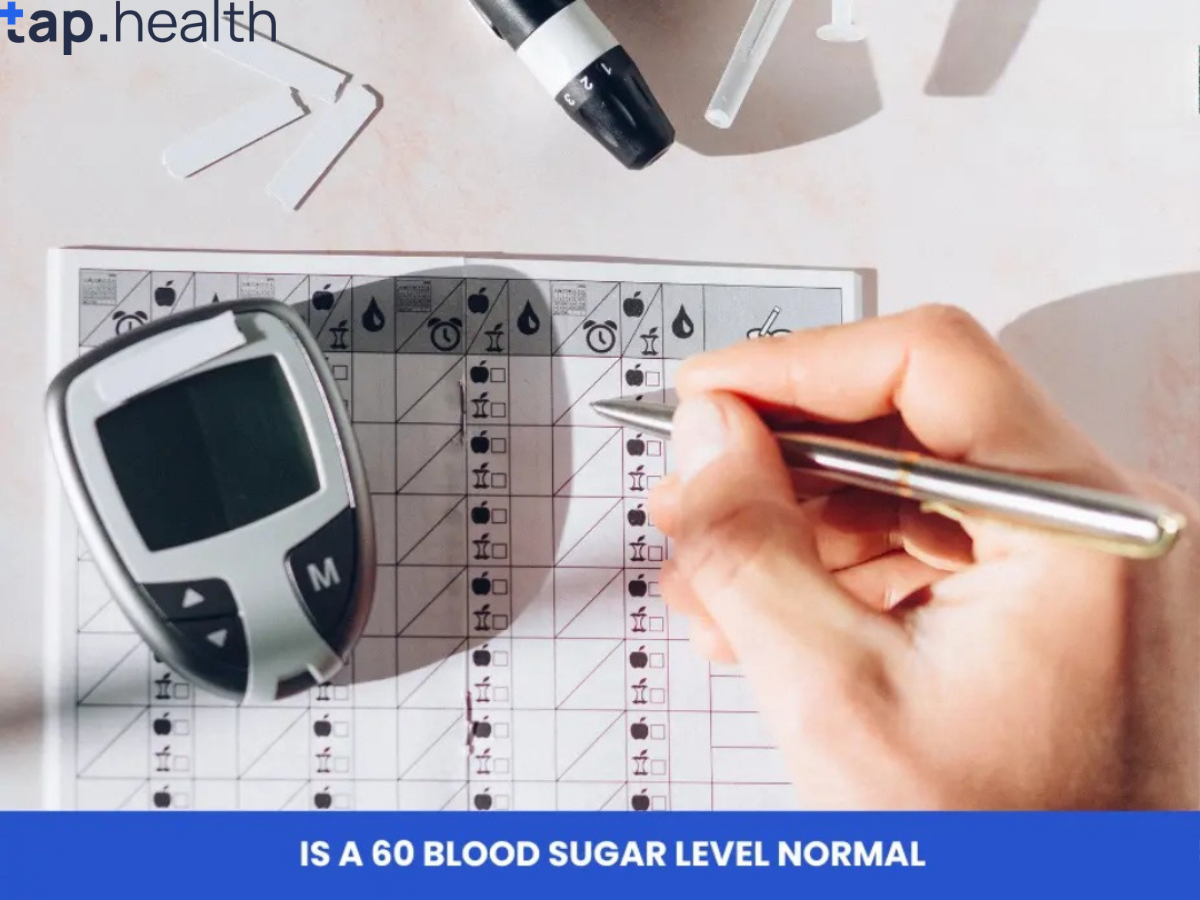Blood sugar levels are a critical part of our health, especially for those managing conditions like diabetes. Keeping track of these levels helps prevent complications and keeps the body functioning well. Many people wonder if a blood sugar level of 60 mg/dL is considered normal. In this article, we’ll break down what blood sugar levels mean, why they’re important, and what to do if they drop too low. Let’s keep it simple and easy to understand while covering everything you need to know.
What Are Blood Sugar Levels?
Blood sugar levels, or glucose levels, measure the amount of glucose in your blood. Glucose is the primary source of energy for the body and comes mainly from the food you eat. Insulin, a hormone produced by the pancreas, helps control your blood sugar levels by moving glucose into your cells for energy.
Normal Blood Sugar Levels
Blood sugar levels can vary depending on the time of day and the last time you ate. Here’s a quick guide to normal blood sugar ranges:
- Fasting (no food for 8 hours): 70–99 mg/dL
- 2 hours after a meal: Less than 140 mg/dL
- Random (any time): 70–140 mg/dL
Key Insight: A blood sugar level of 60 mg/dL is generally considered low, especially for people without diabetes. This condition, known as hypoglycemia, can have serious health implications if not managed properly.
Is a Blood Sugar Level of 60 mg/dL Normal?
A blood sugar level of 60 mg/dL is below the normal range and is considered low blood sugar. While some people, particularly those with diabetes, may experience this level without symptoms, most individuals may feel effects. Common causes include skipping meals, intense exercise, or taking too much insulin or medication.
Understanding Hypoglycemia (Low Blood Sugar)
Hypoglycemia occurs when blood sugar levels drop too low, usually below 70 mg/dL. In some cases, people may experience symptoms even before reaching this threshold, especially if their body is used to higher blood sugar levels. Symptoms can range from mild to severe.
Symptoms of Low Blood Sugar (Hypoglycemia)
Common signs of hypoglycemia include:
- Dizziness or lightheadedness
- Sweating or chills
- Feeling shaky or anxious
- Rapid heartbeat
- Confusion or difficulty focusing
- Hunger or nausea
When blood sugar levels fall too low, it can lead to severe complications like seizures or loss of consciousness if left untreated. It’s important to address low blood sugar immediately.
Causes of Low Blood Sugar
There are several reasons blood sugar levels may drop to 60 mg/dL or lower:
- Skipping Meals or Not Eating Enough: Going long periods without food or not eating enough carbohydrates can lower blood sugar.
- Excessive Physical Activity: Vigorous exercise can use up glucose stores, leading to lower levels.
- Diabetes Medications: Insulin or certain medications for diabetes can cause hypoglycemia if taken in excess.
- Alcohol Consumption: Drinking alcohol without eating can lead to a drop in blood sugar, as alcohol can interfere with the liver’s ability to release glucose.
- Hormonal Imbalances: Certain conditions, like adrenal insufficiency, may cause low blood sugar.
How to Treat a Blood Sugar Level of 60 mg/dL
If you experience low blood sugar symptoms and confirm that your blood sugar is 60 mg/dL or lower, take these steps immediately:
- Eat or Drink 15-20 grams of Fast-Acting Carbohydrates:
- Examples include a small glass of juice, 4-5 hard candies, or glucose tablets.
- Recheck Your Blood Sugar After 15 Minutes:
- If it’s still below 70 mg/dL, consume another 15 grams of fast-acting carbs.
- Follow Up with a Snack:
- Once your blood sugar is above 70 mg/dL, eat a small snack that includes protein and carbs to maintain your blood sugar levels.
Preventing Low Blood Sugar
Here are a few tips to help prevent blood sugar from dropping too low:
- Eat Regular Meals and Snacks: Balanced meals and snacks throughout the day can help stabilize blood sugar.
- Check Your Blood Sugar Regularly: If you’re managing diabetes, regular monitoring helps you know when levels might be dropping.
- Avoid Alcohol on an Empty Stomach: Always eat when drinking alcohol to prevent blood sugar drops.
- Work with a Doctor: Your healthcare provider can help adjust your medication if you’re experiencing frequent hypoglycemia.
When to See a Doctor
If you’re frequently experiencing low blood sugar episodes or feel symptoms like dizziness or confusion, talk to your doctor. A medical professional can help identify underlying causes and adjust any medications. Severe hypoglycemia that requires outside help or causes loss of consciousness is an emergency and requires immediate medical attention.
FAQs on Blood Sugar Levels
Q1: Is a blood sugar level of 60 mg/dL dangerous?
A: Yes, a blood sugar level of 60 mg/dL is considered low and can lead to symptoms like dizziness, confusion, and shakiness. If untreated, it may become severe and lead to loss of consciousness.
Q2: What should I do if my blood sugar is 60 mg/dL?
A: Consume 15-20 grams of fast-acting carbohydrates (such as juice or glucose tablets), wait 15 minutes, and recheck your levels. If it’s still low, repeat. Follow up with a small snack that includes protein and carbohydrates.
Q3: Can I prevent low blood sugar if I have diabetes?
A: Yes. Eating balanced meals, monitoring blood sugar regularly, and consulting with your healthcare provider about your medications can help you avoid hypoglycemia.
Q4: What are the main symptoms of low blood sugar?
A: Common symptoms include shakiness, dizziness, sweating, confusion, and rapid heartbeat.
Q5: How can I know if my blood sugar is dropping too low?
A: Besides symptoms like hunger, shakiness, and lightheadedness, using a blood glucose monitor helps confirm if levels are low.
Conclusion
Blood sugar levels are essential to monitor, especially for those with diabetes or hypoglycemia risk factors. A level of 60 mg/dL is below the normal range, indicating low blood sugar. It’s crucial to recognize the symptoms and know how to respond to prevent severe consequences. Always keep fast-acting carbohydrates on hand if you’re prone to hypoglycemia and consult your doctor for personalized guidance.
References
- https://my.clevelandclinic.org/health/diagnostics/12363-blood-glucose-test
- https://www.mountsinai.org/health-library/tests/blood-sugar-test-blood
By staying informed, you can better manage your blood sugar levels and maintain your overall health.



